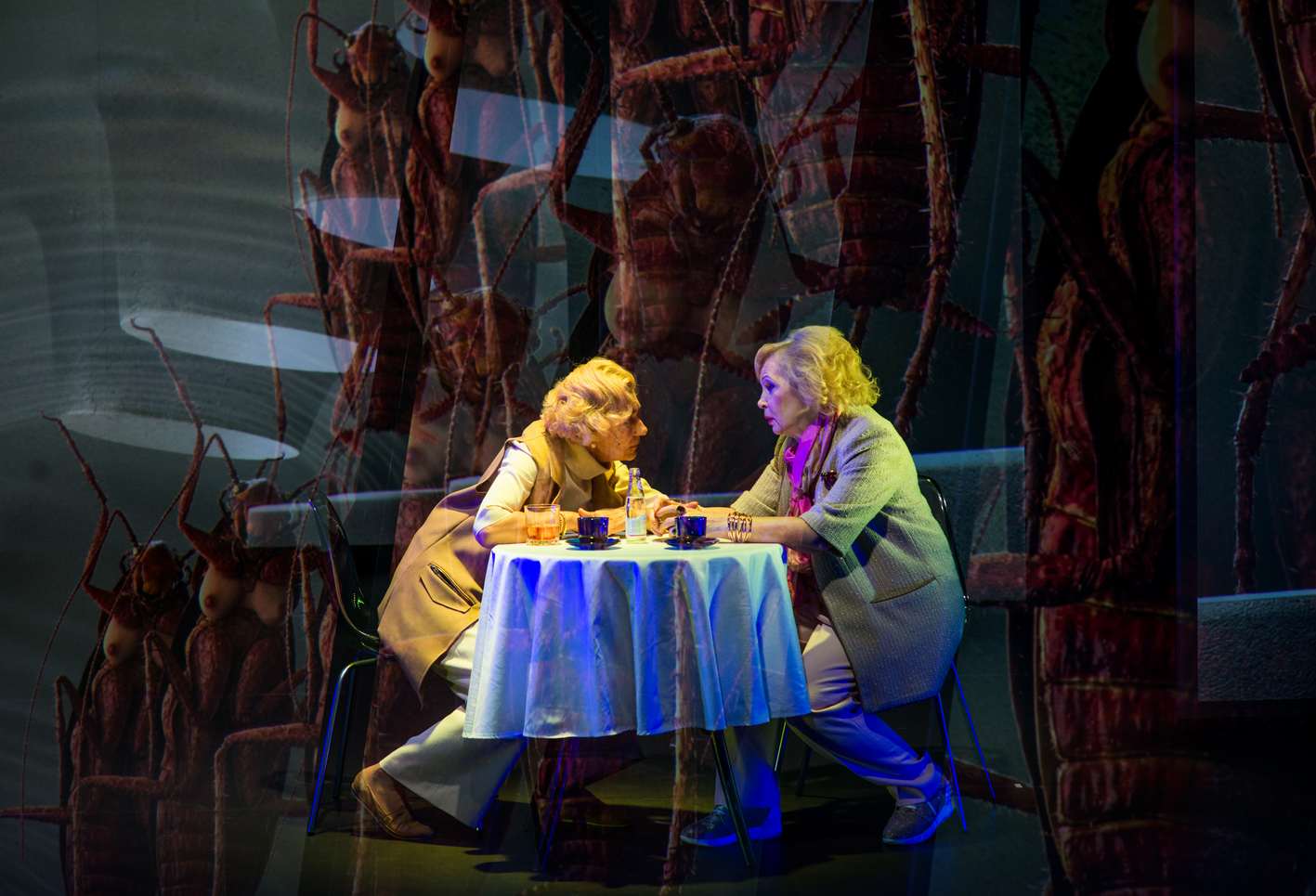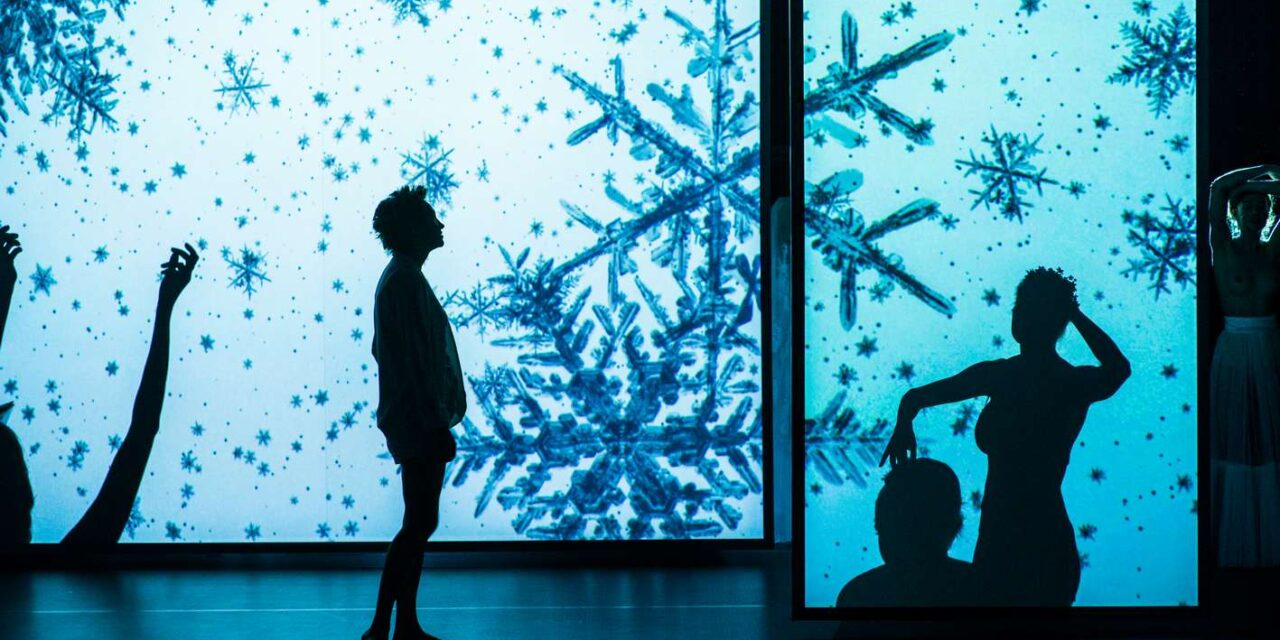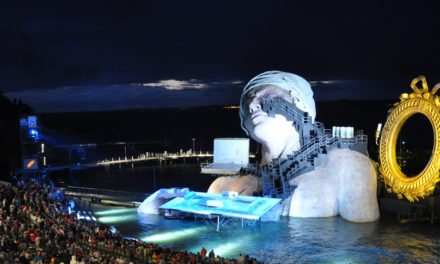Of all the unexpected things I think I might be able to imagine, one I could never have imagined for a minute was Alexander Zeldovich’s production of Sarah Kane’s 4.48 Psychosis at the Stanislavsky Electrotheatre in Moscow in 2016. Whether I was right or wrong (it turns out I was wrong), Kane and 4.48 Psychosis epitomized for me the ultimate one-person play, the logical full-extension, the terminal stop of what a single individual, a single psyche, could do in a text of self-introspection. The play for me was utterly and incontrovertibly simple. Direct. Unadorned.
Then came Zeldovich, a highly-respected film director. He has not been prolific, but he hasn’t wasted time or effort, either. His feature film debut with Isaac Babel’s Sunset in 1990 was a notable release in a year when few were paying attention to Russian films. His next major release was Moscow (2000), which, again stood out starkly against a murky field of competitors. Eleven years on, in 2011, he once again captured the attention of a moribund industry with Target, the second time in a row he collaborated with renowned Russian novelist and playwright Vladimir Sorokin on a screenplay.
But Zeldovich also had a soft spot for theatre. He had studied in Anatoly Vasilyev’s famous workshop in the 1980s, and in 2003 he made his stage directing debut with a version of Othello that featured several actors from the Vasilyev clan. More important for us today is that to help him stage Shakespeare he engaged the team of artists known as AES+F (Tatyana Arzamasova, Lev Evzovich, Yevgeny Svyatsky, and Vladimir Fridkes). Their multimedia, conceptual work had a major impact on Zeldovich’s production of Sarah Kane, yanking it utterly and totally out of the ordinary. Zeldovich called his production Psychosis, dropping the 4.48, presumably to acknowledge that his was an interpretation, a version, even a translation, if you will, to a new time and place.
Instead of a single, lonely, tortured individual confronting her demons, Zeldovich and AES+F imagined a stage full of sisters, if you will, cousins and nieces and grandmothers of the female experience. Nineteen women of vastly differing ages and personal styles took on the bits and pieces of a shattered psyche that Sarah Kane committed to paper, and brought them to life, each in their own way.
But that was only the beginning of the reinterpretation. AES+F projected huge animated video figures looming over the women on stage, as if they were trapped in a video game that they could not escape. The animated world towering over them was sometimes abstract, sometimes threatening, sometimes bizarre, sometimes humorous, but rarely narrative.
It is not my purpose here to provide a full picture of Alexander Zeldovich’s production of Psychosis. That is all the more true because I am an insider working from within the Stanislavsky Electrotheatre. But, more importantly, by watching the stream of it that is offered by The Theatre Times and the Electrotheatre, you can draw your own conclusions.
Performed in Russian, Psychosis is accompanied by subtitles that Zeldovich and I put together using Kane’s original text. Kane scholars out there will be intrigued to hunt down the few short passages that Zeldovich cut from his production.

Lyudmila Rozanova and Tatyana Nazarova in Psychosis, Stanislavsky Electrotheatre (Moscow, Russia). Photo: Olympia Orlova.
Psychosis is just one of several productions that will be streamed during The Theatre Times’ International Online festival. Since the theatre was rebuilt, rebranded, and rethought five years ago, it has transformed the old, tired Stanislavsky Drama Theatre into one of Moscow’s most exciting, innovative houses. The variety of the repertory is astonishing, ranging from contemporary opera and major works by such world renowned directors as Theodoros Terzopoulos, Heiner Goebbels, and Romeo Castellucci, to artistic director Boris Yukhananov’s self-proclaimed blockbusters, such as The Blue Bird, a three-day trilogy, and the innovative The Golden Ass and Orphic Games series, which run five and six days respectively.
As one of the promotional, educational and cultural events surrounding the premiere of Psychosis in 2016, the Electrotheatre invited the late, great Elyse Dodgson to Moscow. Elyse was a rock star in Moscow. In her capacity of head of the International Department of the Royal Court Theatre, she was a moving force in the formation of the Russian New Drama movement in the early 2000s. Russian critic and educator Kristina Matvienko and I, looking to mount an interesting event around the premiere of Psychosis, also knew, of course, that Elyse had been close to Sarah Kane, had been beside her as she wrote her last plays. What a connection that would make as the first performances of Psychosis were taking place on the Electrotheatre main stage!
Matvienko’s genius for mounting public events, combined with the full support of Boris Yukhananov, made for a jam-packed three or four days as huge crowds descended upon the theatre’s lobby to attend talks with Dodgson and Zeldovich, special meetings with Dodgson alone, TV and radio appearances focussed on Dodgson, and talk backs about the new interpretation of Sarah Kane’s last play.
We had no idea what Dodgson would think of Zeldovich’s Kane. When we were still kicking around the idea of bringing Elyse to Moscow, I said to Kristina Matvienko, “You know, she may really hate it. Are we ready for that?” Kristina, ever the wise woman, came back at me immediately, “Of course! Her opinion is her opinion. Whatever she has to say will be of interest.”
Kristina and I later did an interview with Elyse in which we asked about Zeldovich’s take. For the record, here is her complete response, as originally published on the HowlRound website [https://howlround.com/elyse-dodgson-sarah-kane].
“It’s very hard to say what Sarah Kane would have wanted when she was 28 and, obviously, what she might have wanted now. I think she was very meticulous about her plays. I remember when Cleansed was being produced at the Berliner Ensemble, she was absolutely furious that a word of stage direction had been changed, and she was very disheartened by that. But she changed as a writer over every play. 4.48 Psychosis doesn’t have characters and it doesn’t say how many actors. It really is a very open text, and I think it was very important to her how the play was going to be produced the first time. I’m sure she would have wanted the production she had—the absolute integrity, meticulousness, and brilliance that James Macdonald [the original director – JF] brought to it.
“But now we are talking about sixteen years after the original production; of a play that has become a classic. I think people should stay true to the text first. I think they can probably interpret the text with more freedom later. I didn’t know how I was going to feel about seeing it. I did notice that some of the texts were dropped and repositioned. I was aware that the numbers were missing. Some things seemed absolutely out of the ballpark. In terms of some of the scenes, I thought Sarah would have been amused actually. Some things were incredibly moving.”
For those of you who have not seen Psychosis in Moscow, The Theatre Times and the Stanislavsky Electrotheatre now make it possible for you to draw your own conclusions.
This post was written by the author in their personal capacity.The opinions expressed in this article are the author’s own and do not reflect the view of The Theatre Times, their staff or collaborators.
This post was written by John Freedman.
The views expressed here belong to the author and do not necessarily reflect our views and opinions.


















